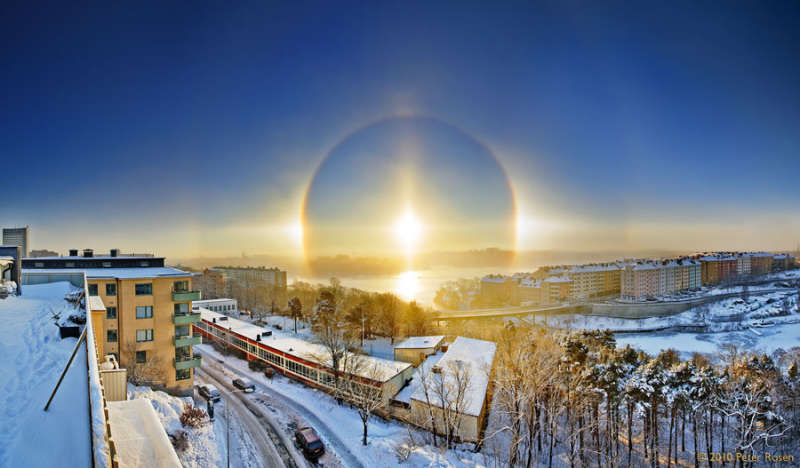Credit & Copyright: Peter RosIn
Explanation:
What's happened to the Sun?
Sometimes it looks like the Sun is being viewed through a large
lens.
In the above case, however, there are actually millions of lenses:
ice crystals.
As water freezes in the upper
atmosphere, small, flat, six-sided, ice crystals might be formed.
As these crystals flutter to the ground, much time is spent
with their faces flat, parallel to the ground.
An observer may pass through
the same plane as
many of the falling ice crystals near sunrise or sunset.
During this alignment, each crystal can act like a miniature lens,
refracting sunlight into our
view and creating
phenomena like parhelia, the technical term for
sundogs.
The above image was taken
last year in
Stockholm,
Sweden.
Visible in the image center is the Sun, while two bright
sundogs glow prominently from both the left and the right.
Also visible is the bright
22 degree halo -- as well as the rarer and much fainter
46 degree halo --
also created by
sunlight reflecting off of atmospheric ice
crystals.
1999 2000 2001 2002 2003 2004 2005 2006 2007 2008 2009 2010 2011 2012 2013 2014 2015 2016 2017 2018 2019 2020 2021 2022 2023 2024 2025 |
Yanvar' Fevral' Mart Aprel' Mai Iyun' Iyul' Avgust Sentyabr' Oktyabr' Noyabr' Dekabr' |
NASA Web Site Statements, Warnings, and Disclaimers
NASA Official: Jay Norris. Specific rights apply.
A service of: LHEA at NASA / GSFC
& Michigan Tech. U.
|
Publikacii s klyuchevymi slovami:
Sun halo - Sun dogs - Sweden - galo - lozhnoe solnce
Publikacii so slovami: Sun halo - Sun dogs - Sweden - galo - lozhnoe solnce | |
Sm. takzhe:
Vse publikacii na tu zhe temu >> | |
